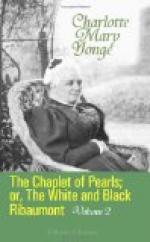CHAPTER XXV. THE VELVET COACH
No, my good Lord, Diana— ALL’S WELL THAT ENDS WELL
A late autumn journey from the west coast to Paris was a more serious undertaking in the sixteenth century than the good seaman Master Hobbs was aware of, or he would have used stronger dissuasive measures against such an undertaking by the two youths, when the elder was in so frail a state of health; but there had been a certain deceptive strength and vigour about young Ribaumont while under strong excitement and determination, and the whole party fancied him far fitter to meet the hardships than was really the case. Philip Thistlewood always recollected that journey as the most distressing period of his life.
They were out of the ordinary highways, and therefore found the hiring of horses often extremely difficult. They had intended to purchase, but found no animals that, as Philip said, they would have accepted as a gift, though at every wretched inn where they had to wait while the country was scoured for the miserable jades, their proposed requirements fell lower and lower. Dens of smoke, dirt, and boorishness were the great proportion of those inns, where they were compelled to take refuge by the breaking down of one or other of the beasts, or by stress of weather. Snow, rain, thaw and frost alternated, each variety rendering the roads impassable; and at the best, the beasts could seldom be urged beyond a walk, fetlock-deep in mire or water. Worse than all, Berenger, far from recovered, and under the heavy oppression of a heartrending grief, could hardly fail to lose the ground that he had gained under the influence of hope. The cold seemed to fix itself on the wound on his cheek, terrible pain and swelling set in, depriving him entirely of sleep, permitting him to take no nourishment but fragments of soft crumbs soaked in wine or broth— when the inns afforded any such fare—and rendering speech excessively painful, and at last unintelligible.
Happily this was not until Philip and Humfrey both had picked up all the most indispensable words to serve their needs, and storming could be done in any language. Besides, they had fallen in at La Motte-Achard with a sharp fellow named Guibert, who had been at sea, and knew a little English, was a Norman by birth, knew who the Baron de Ribaumont was, and was able to make himself generally useful, though ill supplying the place of poor Osbert, who would have been invaluable in the present predicament. Nothing was so much dreaded by any of the party as that their chief should become utterly unable to proceed. Once let him be laid up at one of these little auberges, and Philip felt as if all would be over with him; and he himself was always the most restlessly eager to push on, and seemed to suffer less even in the biting wind and sleet than on the dirty pallets or in the smoky, noisy kitchens of the inns. That there was no wavering of consciousness was the only comfort, and Philip trusted to prevent this by bleeding him whenever his head seemed aching or heated; and under this well-meant surgery it was no wonder that he grew weaker every day, in spite of the most affectionate and assiduous watching on his brother’s part.




